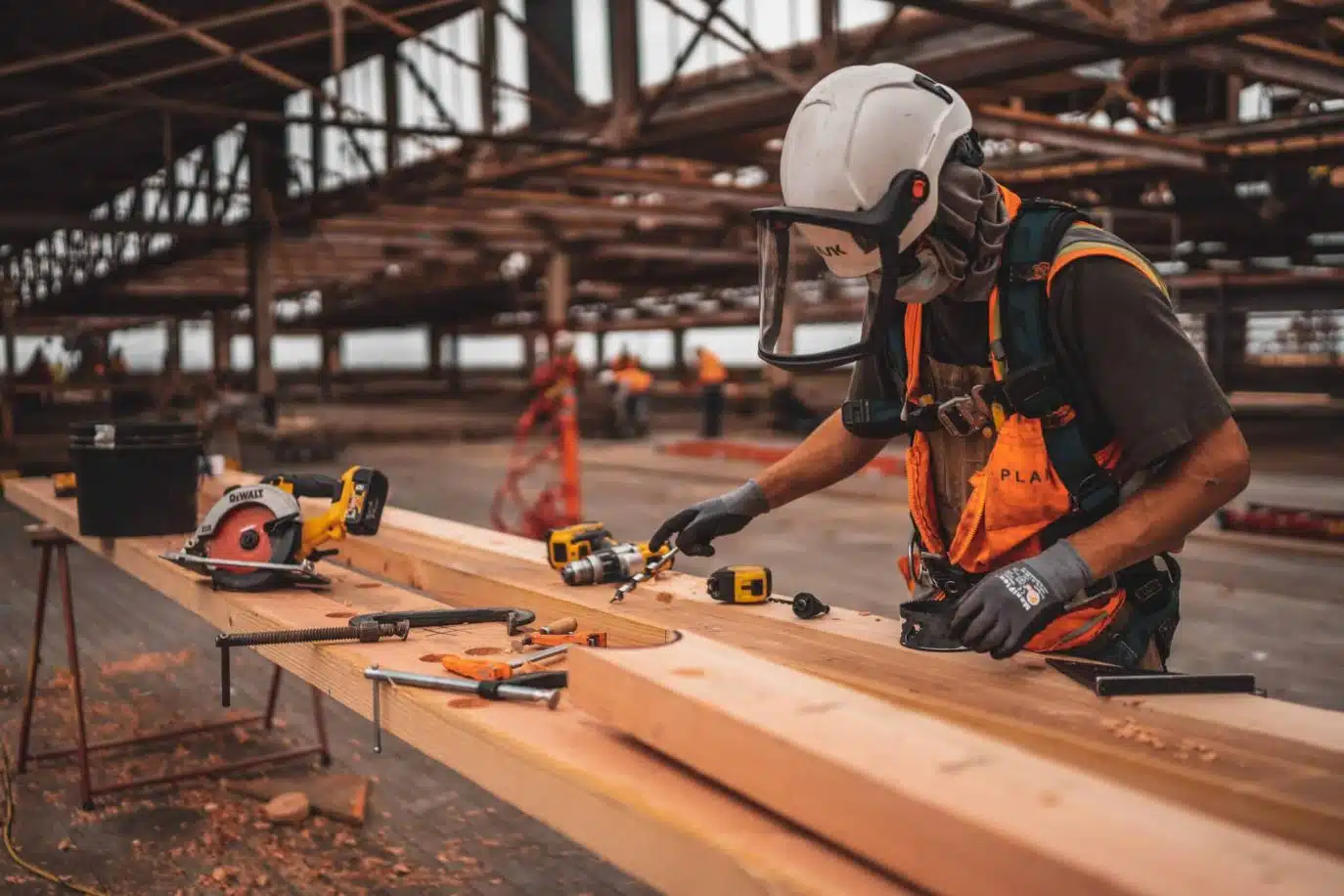Introduction to Construction Finance
Construction finance is a specialized area that focuses on the financial management of a construction project, from initial planning to project completion. For construction businesses and construction companies, understanding construction finance is essential to ensure that building projects are delivered on time and within budget. Estimating the total project cost is crucial to ensure adequate funding and avoid shortfalls throughout the construction project lifecycle. This involves careful resource allocation and allocation of financial resources to cover construction costs, manage cash flow, and address any unexpected expenses that may arise during the construction process.
Project managers play a crucial role in overseeing the financial aspects of a construction project, ensuring that funds are available when needed and that spending aligns with the project’s goals. Effective construction finance helps construction businesses secure funding, mitigate financial risks, and support business growth. By mastering the principles of construction finance, companies can make informed decisions, maintain financial stability, and position themselves for long-term success in a competitive market.
Managing Cash Flow in Construction
Managing cash flow is one of the most critical challenges for construction companies. Construction projects often require significant upfront investment in materials, labor, and equipment, while payments from clients may be delayed until certain project milestones are reached. This can create cash flow gaps that threaten the smooth execution of projects and put financial strain on the business.
To maintain healthy cash flow, construction companies should implement strategies such as prompt invoicing, negotiating favorable payment terms with suppliers, and setting aside a cash reserve to handle unexpected expenses, unexpected costs, or changes in project timelines. Utilizing construction financing options like construction loans or contractor lines of credit can also provide a financial buffer, allowing companies to bridge cash flow gaps and keep construction projects moving forward. By proactively managing cash flow, construction businesses can avoid disruptions, meet their financial obligations, and ensure the successful completion of every project.
Understanding how to start a construction company is not enough. You also need to know how to secure adequate funding for your operations. Without it, growth and success will be hard to come by.
Starting or operating a construction business in this day and age is an impressive feat. There are tons of things to consider and important decisions to make.
And if you take a wrong step, you could put your whole business in jeopardy, even before it takes off.
However, if you have access to adequate funding, this task will be easier on you. You’ll be sure to have enough resources to keep your cashflow going. Securing funding is especially critical for large projects, as these require higher capital to cover extensive costs and ensure smooth progress.
Delinquent clients or unforseen expenses won’t affect your operations. You will complete projects in time, satisfy your clients, and earn their trust.
And when your clients trust you, they’ll refer you to other leads, which will aid your business growth. All this starts by getting the right funding. It’s important to explore various funding options, such as capital raising, seeking additional capital from potential investors, and forming strategic partnerships to support your construction projects and expansion.
In this article, we’ll talk about the different ways you can finance your construction business, including working with financial institutions to access the necessary funding for business growth.
#1 – Construction Business Loans
These are high interest short-term loans specially tailored to fund construction projects. They often last for a year and cover the expenses incurred during the project. They’re ideal if you’re carrying out major renovations on a property or building a house from scratch. Construction loans work by providing funds in stages according to a draw schedule, which outlines when and how much money is disbursed as the project progresses through different phases. Funds are typically released during the construction phase as specific milestones are met, ensuring oversight and proper management of the project.
The loan application process for these loans is usually straightforward but they’re not easy to secure. You need a good credit rating as well as detailed construction plans. A good credit history is essential, as it demonstrates your creditworthiness and significantly improves your chances of a successful loan application. You must have appraised the value of the planned property too.
To boost your chances, sell your project and your company in the application. Write your proposal in an easy to understand manner. There’s no harm in getting an expert writer for this task.
Once you get approved, you’ll get funding in installments based on your project timeline. The loan amount is determined by your project needs and cost estimates, ensuring you have sufficient funds for each stage as outlined in the draw schedule.
Repayment could be in installments or in full at the maturity of the loan. The loan term and repayment terms will affect your monthly payments and the overall cost of borrowing. Some construction loans may offer fixed rates, providing stability and predictability for budgeting. You can also convert it into a permanent mortgage, which transitions your construction loan into long-term financing. Everything depends on the initial terms and agreements.
#2 – Small Business Association (SBA) Loans
SBA Loans (also known as SBA 7(a) loans) are a type of small business loan and are the go-to financing option for most construction businesses. They provide funds that you can use to grow your business however you see fit. If you’re considering borrowing money for business purposes, it’s important to be aware of tax law compliance and proper loan set-up.
These loans are offered by lenders in partnership with the SBA program. The Australian government guarantees the loan in that it co-signs it with you. This means they’ll shoulder part of the repayment in case you default.
However, your business must qualify as a small business under the SBA’s definition to be eligible. The interest rate differs from one affiliate lender to another but it’s often above 10%. The repayment period can vary too although it’s between 5 to 10 years. When compared to traditional banks, SBA loans may have a more involved approval process, but they can sometimes offer faster approval than traditional banks, depending on the lender.
SBA loans tend to have more flexible terms and conditions than traditional construction loans or traditional mortgages. Unlike traditional mortgages, which are typically used for purchasing existing properties, SBA loans are structured to support business growth and can be used for a wider range of purposes. That’s why getting approval is often difficult, especially for those who handle big projects. But if you meet the requirements and write a good proposal, your chances of getting approval are higher.
#3 – Equipment Financing
This is one of the most important business loans for construction companies. This financing option covers expenses associated with acquiring essential construction equipment. This includes forklifts, bulldozers, trucks, and so on. Equipment financing is often used for heavy machinery that is critical to construction work.
Equipment financing is typically a type of secured loan. Secured loans require collateral, and in this case, the equipment being financed acts as the collateral. If the borrower defaults, the lender can repossess the equipment. You get the new equipment and then pay for it with interest over time. Once you’ve completed the payments, the equipment becomes totally yours.
The interest rate for equipment financing ranges between 4% to 40% over a specified period. The application process is usually smooth, with little paperwork required. And you can get approval in as little as 48 hours after submission. Equipment leasing is also an alternative to purchasing, offering benefits such as improved cash flow and flexibility for short-term projects or technological upgrades.
#4 – Revenue Based Financing
Revenue based financing is not a loan per se. It’s an agreement to sell a portion of your future revenue to a lender. Revenue based financing is a form of short term financing, often used to cover immediate cash needs or bridge funding gaps.
How much you can get depends on how much money you make. Typically, this is about 33% of your annual revenue. The lender will make the funds available to you and you pay it back in the future
To get approved, you need to show the lender your past as well as projected future revenues. You also have to specify how you’re going to use the funds. Revenue based financiers always want to lend money for activities geared towards growth and expansion.
However, think carefully and consider the costs before committing to this type of financing. Assess your financial situation to ensure this option aligns with your needs. Understand the loan terms and be sure it won’t hinder your future growth.
#5 – Contractor Line of Credit
A contractor line of credit works just like a business or personal line of credit.
You apply for funds at a lending institution. If approved, you’ll get access to a lump sum of money that you can withdraw from at any time. And you pay interest only on the money that you withdraw from the account.
The amount of money you get depends on your credit rating and capacity for repayments. You also need to show the lender your financial statements and other business documents for approval.
You can use a contractor line of credit to plug holes in your business’ cash flow. They can come in handy in purchasing materials for your next project or paying temporary site workers. Contractor lines of credit are flexible and can be used for a broad range of business needs, including scaling up for larger projects.
#6 – Invoice Financing & Factoring for Cash Flow
This is similar to revenue based financing in that you leverage your future earnings to get money now. But in this case, you get funding solely based on invoices clients are yet to pay. Invoice financing is a type of debt financing, where your unpaid invoices serve as collateral for the loan.
Here’s how invoice financing and factoring work:
With invoice financing, you use unpaid invoices as proof that you have the capacity to pay the loan. On approval, the lender will provide the loan – usually a percentage of your unpaid invoices. If your business has a higher volume of unpaid invoices, you may qualify for a larger loan. And you pay the loan when your clients fulfill their obligations and pay your invoices. Repayments can often be structured as monthly payments, which helps manage your cash flow more effectively.
But with invoice factoring, you’re actually selling your unpaid invoices to the lender. After giving you the loan, they’ll be in charge of collecting the payment from your clients. When they do, they’ll deduct what you borrowed plus any fees and send the rest to you.
Both options provide funds when clients are yet to pay you and you need money to run your business. Instead of waiting around, you can apply for it, get funding, and then pay later.
However, the interest rates for these financial instruments are often high. Take note of the terms and conditions attached to the funds too.
Capital Raising Strategies for Construction Companies
Capital raising is a vital part of running a successful construction business, especially when it comes to taking on larger projects or expanding operations. Construction companies have a broad range of funding options at their disposal, and choosing the right mix can make all the difference in maintaining healthy cash flow and supporting business growth.
One of the most common capital raising strategies is debt financing, where construction businesses borrow funds from financial institutions such as banks or non bank lenders. This approach allows companies to access the capital needed for construction projects while retaining full ownership of the business. Debt financing can include traditional construction loans, small business loans, or even lines of credit, each with their own loan terms and interest rates. By carefully managing repayments and monitoring financial limits, construction companies can use debt financing to bridge cash flow gaps and cover high upfront costs.
Equity financing is another powerful tool, involving the sale of shares in the construction company to potential investors. This method not only provides additional capital but can also bring in valuable expertise and industry connections. Strategic partnerships with venture capital or private equity firms can offer significant funding sources, as well as guidance on scaling operations and managing complex construction projects.
Alternative funding options, such as crowdfunding and peer-to-peer lending, are becoming increasingly popular in the construction industry. These platforms can help construction companies secure funding quickly, often with more flexible requirements than traditional banks. Additionally, government-backed programs, including small business loans and grants, can provide essential support for new projects or business expansion.
By diversifying their capital raising strategies and exploring a variety of funding sources, construction companies can reduce their reliance on any single option and increase their financial stability. This proactive approach ensures that construction businesses have the resources they need to manage cash flow, overcome unexpected expenses, and achieve long-term success in a competitive market.
Construction Industry Trends Impacting Financing
The construction industry is constantly evolving, and several key trends are shaping the way construction companies approach financing. Changes in government regulations, such as stricter building codes or new environmental standards, can increase construction costs and require additional financial planning. Financing for commercial properties is also impacted by these regulatory and financial trends, as investors and developers must account for higher expenses and compliance requirements. The growing demand for sustainable and energy-efficient building projects means that construction companies may need to invest in new technologies and materials, which can impact their funding needs.
Advancements in construction methods, such as modular construction and prefabrication, are also changing traditional financing models. These innovations often require different types of construction financing and may involve new funding sources or partnerships. To stay competitive and secure funding for new projects, construction companies must keep up with industry trends and adapt their financial strategies accordingly. By staying informed and flexible, construction businesses can better navigate the challenges of the modern construction industry and position themselves for continued growth.
Get Adequate Construction Financing For Your Construction Business
It isn’t enough to know how to start a construction company. You also need to know how to get sufficient funding for it.
When you have constant access to funds, you’ll easily plug cash flow gaps in your operation. This ensures a timely completion of projects, boosts your status and guarantees business growth.
To make this happen, consider the 6 construction business financing options mentioned in this piece. This way, you’ll get adequate funding when you need it without any hassles.
If you’d like to secure loans for your construction business, we at Unsecured Finance Australia are happy to help.
We offer the best unsecured business loans for your business. As non bank lenders, we can offer faster approval and more flexible funding options compared to traditional banks.
Apply online and you can receive your approval within the next 24 hours.
Conclusion
In conclusion, construction finance is a multifaceted discipline that plays a critical role in the success of any construction company. Navigating the complexities of construction loans, small business loans, and alternative funding sources is essential for securing the capital needed to launch and complete construction projects. By understanding how different construction loans work, including options like interest-only loans and drawdown loans, construction businesses can make informed decisions that align with their financial goals and project timelines.
Effective management of cash flow is equally important, as it allows construction companies to meet operational costs, pay interest on borrowed funds, and handle unexpected expenses or cost overruns. Leveraging project management software and maintaining accurate financial statements can help project managers track spending, allocate resources efficiently, and ensure projects stay on budget.
Risk management should also be a top priority. By working closely with financial advisers and implementing strategies to mitigate financial risks, construction companies can minimize the impact of unplanned expenses and maintain financial stability. Exploring a broad range of funding options and building relationships with various funding sources—such as financial institutions, non bank lenders, and potential investors—can help construction businesses overcome cash flow gaps and support ongoing business growth.
Ultimately, mastering construction finance empowers construction companies to secure funding, manage their finances effectively, and achieve lasting success in the construction industry. Whether you’re a small construction business or a large construction company, understanding your financing options and proactively managing your financial resources will ensure your projects are completed on time, within budget, and to the highest standards.




